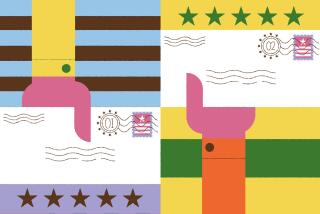Guilty of ‘Flying While Muslim’?
Over Thanksgiving, my wife and I took our kids to Puerto Vallarta, Mexico. After our relaxing vacation, we returned home to Los Angeles, only to face some disconcerting homeland insecurity.
We were met by two Immigration and Customs Enforcement officers as soon as we left the jetway at LAX. Evidently, they were looking for someone, and it turned out to be me.
When they looked at my name, they provided us with an armed escort to a special area. All I could think about at the time was my kids. I prayed they would not be exposed to anything that would cause them to resent their birthplace, the United States, as a result of this encounter with law enforcement.
One officer told us that we had nothing to worry about; if something was wrong, then we would be in handcuffs. I thought to myself: If I was on a “no fly” list, then why was I allowed to leave L.A. on an airplane in the first place and to board another flight for my return?
One officer asked whether we had committed any criminal act in the past or had done anything that would warrant an investigation. I looked at my children, and my heart sank. Of course the answer was no, but just being asked such a question in front of your children was appalling.
Then came a man named Tommy Scott, dressed in civilian clothes, who seemed to be experienced in interrogations. He had no credentials, at least none that were visible, and we were too disoriented to ask. He asked about the purposes for our travels. He wanted to know which charities we donated to and whether those organizations send money overseas.
This line of questioning reminded me of a brochure issued by the FBI two months ago in partnership with Arab, Muslim and Sikh organizations: “If I give money to charity that is investigated for ties to terrorism, will I be investigated? It is not a crime to contribute to a legitimate charity and no one will be prosecuted for doing so. You may wish to discuss with your mosque and community leaders where the money is going before you contribute.
“If I travel to the Middle East, will I come under the scrutiny of the American government? Legitimate travel to most areas of the Middle East will not result in any type of scrutiny.”
So, do those FBI words carry any weight or are they just meaningless attempts to win public relations points with communities of interest? Individuals can be punished for misleading statements given to the government, but what about misleading government statements issued to the public?
Scott scribbled notes on his pad and walked away. The customs officers, playing the “good cops,” kept assuring us that we would be released within five to 10 minutes. However, not until I told them about my work with the FBI, the Department of Homeland Security and the Department of Justice did they start calling around to expedite my departure. In my role as the executive director of the Muslim Public Affairs Council, I had even worked with the Treasury Department to promote legitimate charitable activities of American Muslim institutions.
Anyone detained as I was and unaware of his rights could have been kept at the airport for hours or longer. This is where the war on terror has gone awry -- wasting valuable resources, alienating allies and eroding partnerships between law enforcement and grass-roots communities. If we Americans learned anything from 9/11, it is that we should do everything possible to promote cooperation and oppose humiliating and intimidating people in the fight against terrorism. While sitting in the detention area, my 12-year-old son asked: “What about the Pledge of Allegiance, where it says liberty and justice is for all. Don’t they have to believe in it, too?” Apparently not.
More to Read
Sign up for Essential California
The most important California stories and recommendations in your inbox every morning.
You may occasionally receive promotional content from the Los Angeles Times.










